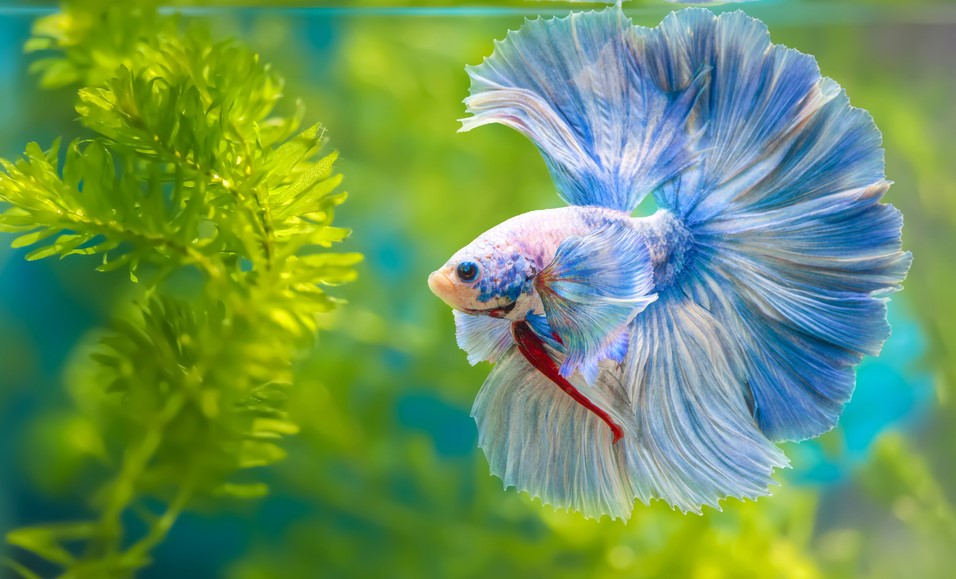Discover the Beauty of Betta Fish
Meet the Betta fish, a stunning and majestic aquatic marvel renowned for its vibrant colors, elaborate fins, and captivating personality. Native to Thailand and Cambodia, these incredible creatures have been cherished companions for centuries. With their intelligent, curious nature and remarkable adaptability, Betta fish have become a beloved addition to homes and offices worldwide.
Pronunciation: [bet-ta]
Naming: Betta, Fighting Fish, Betta splenden, Siamese Fighting Fish,
Native Location: Thailand, Cambodia, Loas, Vietnam
Popular Pages
Betta Fish Tank
Create a vibrant underwater oasis for your Betta with our stylish, spacious, and expertly-designed tanks.
Betta Fish Names
Explore Our Extensive Collection of Unique and Inspiring Betta Fish Names. Find the Perfect Match for Your Friend.
Betta Diseases
Protect Your Friend: Learn About Common Betta Fish Diseases, Symptoms, and Effective Treatment Options.
Betta Fish Care
When it comes to Betta fish care, providing a spacious and well-maintained environment is crucial. A minimum 5-gallon tank with a secure lid is ideal, as Betta fish are skilled jumpers. Fill the tank with dechlorinated water, maintained at 76-82°F (24-28°C), and pH levels between 6.5-7.5. Add plants, rocks, and decorations to create hiding places and visual stimulation, ensuring optimal Betta fish care.
Effective Diet and Nutrition for Betta Fish Care
Feed your Betta fish a balanced diet consisting of high-quality commercial pellets or flakes, supplemented with live or frozen foods like brine shrimp or bloodworms. Feed 2-3 times a day, only as much as consumed within 2 minutes. A well-planned diet is vital for Betta fish care, preventing digestive issues and poor water quality. Provide variety to prevent nutritional deficiencies and stimulate your Betta’s natural foraging behavior.
Regular Maintenance for Optimal Betta Fish Care
Regular water changes (25-50% weekly) and proper filtration are crucial for maintaining optimal water quality, a critical aspect of Betta fish care. Clean gravel and decorations regularly, replace filter media, and check water levels. Monitor your Betta’s health closely, looking for signs of illness or stress. By following these essential Betta fish care tips, you’ll create a happy and healthy environment for your Betta fish to flourish.

How Long do Betta Fish Live?
Discover the secrets to a long and healthy life for your Betta fish.
- Average lifespan: 3-5 years
- Factors affecting lifespan: genetics, environment, diet, and health.
- Tips for extending lifespan: optimal tank size, water conditions, and nutrition.

Betta Fish Bubble Nest
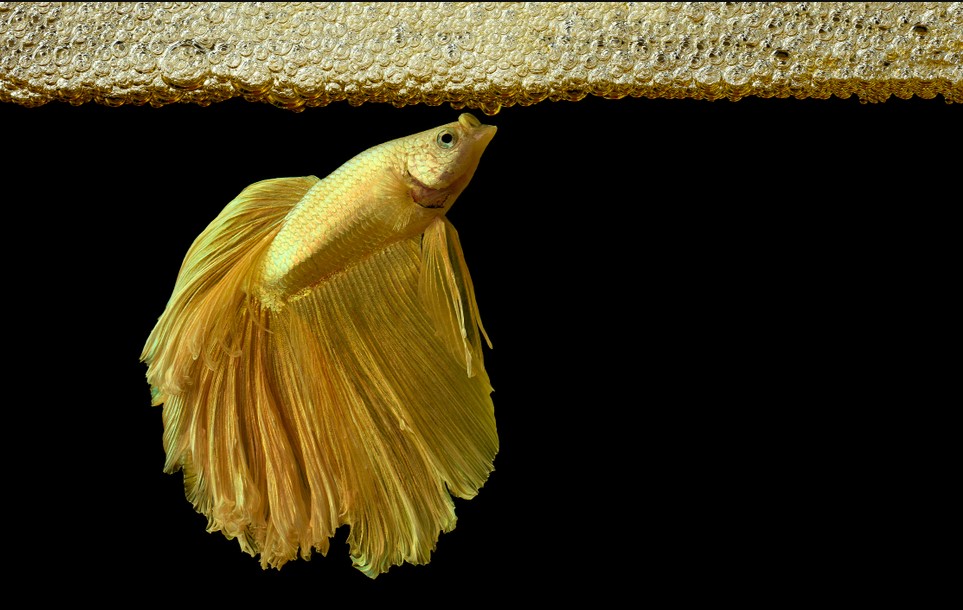
Betta fish create bubble nests as a natural behavior, serving multiple purposes. Males primarily build nests for breeding, incubating eggs, and safeguarding them until they hatch. However, both males and females can create nests, which also provide shelter and establish territorial dominance. These nests are typically built at the water’s surface, attached to plants or decorations.
To encourage bubble nest formation, provide your Betta with a suitable environment. Ensure a secure, covered tank to prevent bubbles from popping, maintain warm water (76-82°F/24-28°C), and moderate water flow. Offer plants, rocks, or decorations for nesting sites. Maintain good water quality and regular water changes to reduce stress.
The presence of bubble nests indicates a healthy, stress-free Betta. Observe your fish’s behavior and adjust its environment accordingly. Avoid disturbing the nest, as this can cause stress. By understanding and supporting this natural behavior, you’ll strengthen your bond with your Betta and ensure its well-being. Regularly monitoring your Betta’s nesting activity can also help identify potential health issues or environmental changes.
Male vs Female Betta Fish
While both male and female Betta fish boast vibrant colors and elegant fins, distinct differences set them apart.
Males are generally more striking, with longer, flowing fins and tails that can reach up to 2-3 inches in length. They also tend to be smaller, typically growing up to 2-2.5 inches in body length.
Females, on the other hand, have shorter, more rounded fins and tails, and are slightly larger, reaching up to 2.5-3 inches in body length.
In terms of anatomy, males have a more pronounced dorsal fin and a thicker, more developed beard-like structure around their mouth.
Females have a more subdued coloration and a smaller, less prominent beard.
When it comes to tank requirements, males are best kept solo in a minimum 5-gallon tank, while females can thrive in smaller schools in tanks of 10-20 gallons or more, provided with plenty of hiding places and plants.
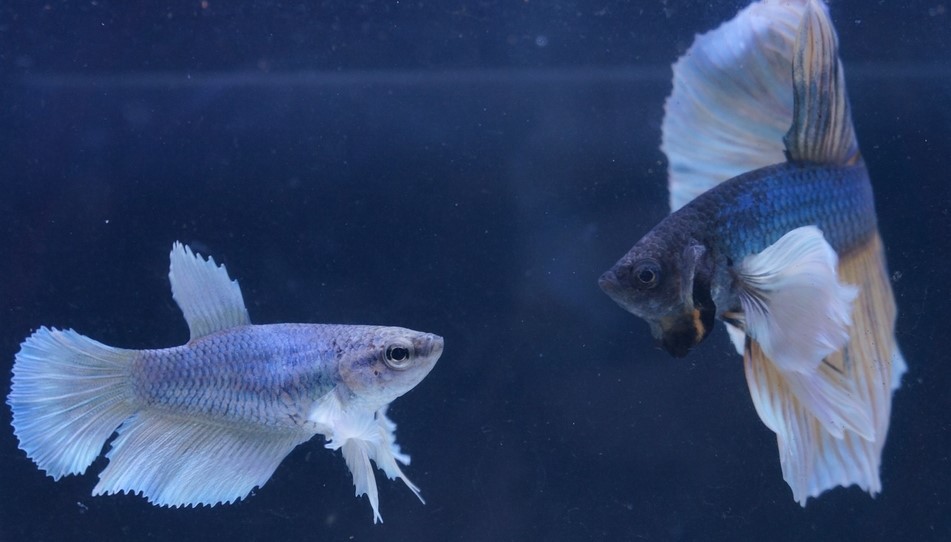
Betta Fish Food and Feeding
Providing a balanced diet is essential for your Betta fish’s health and vitality. A high-quality commercial Betta pellet or flake should serve as the main staple, supplemented with live or frozen foods such as brine shrimp, bloodworms, or daphnia. These additions provide essential proteins, vitamins, and minerals.
Feeding your Betta fish wisely is crucial. Offer 2-3 small meals daily, only as much as can be consumed within 1-2 minutes. Overfeeding leads to digestive issues, poor water quality, and reduced lifespan. It’s also important to vary your Betta’s diet to prevent nutritional deficiencies and stimulate appetite.
When feeding your Betta, consider factors such as water temperature, fish size, and activity level. For example, feed more frequently in warmer waters or during breeding seasons. Avoid feeding human food or table scraps, as these can cause digestive issues. By providing a well-planned diet and careful feeding schedule, you’ll ensure your Betta fish thrives and enjoys a happy, healthy life.
How Long can Betta Fish live without food?
Betta fish can survive without food for 7-10 days, but prolonged fasting can harm their health.
It’s recommended to not exceed 5 days without feeding, as beyond this point, stress and malnutrition can set in.
For optimal health, feed your Betta fish 2-3 times a day, providing a varied and nutrient-rich diet.
Regular feeding maintains their vibrant colors, energetic behavior, and overall well-being. While occasional missed meals won’t harm, consistent neglect can lead to digestive issues and shortened lifespan.
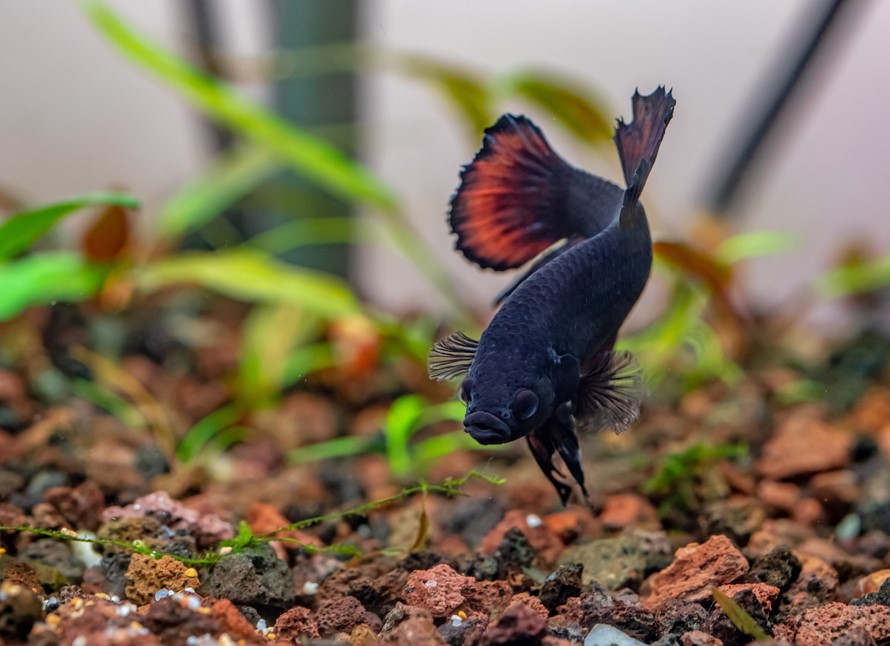
Why Are Betta Fish (Siamese Fighting Fish) Called Fighting Fish?
Betta fish, also known as Siamese Fighting Fish, owe their name to their historical use in fish fighting contests in Thailand (formerly Siam). In the 19th century, locals bred Betta fish for aggression, strength, and endurance, pitting them against each other in makeshift arenas.
The fish fighting tradition dates back to the Ayutthaya Kingdom (1350-1767 CE), where it was considered entertainment for the nobility. The practice spread throughout Southeast Asia and became an integral part of Thai culture. Betta fish were highly valued for their ferocity and ability to withstand injuries.
Despite being banned in many countries, the legacy of fish fighting persists in the name “Fighting Fish.” Today, Betta fish are prized for their vibrant colors, elaborate fins, and unique personalities. Responsible owners keep them as solitary pets, providing suitable environments that cater to their natural instincts.
Interestingly, modern Betta fish still exhibit remnants of their fighting heritage. Males display aggressive posturing, defend territories, and even attack their reflections. By understanding their complex history, owners can better appreciate these remarkable creatures and provide them with enriching environments.
How Long Do Betta Fish Sleep?
Betta fish, like all living creatures, require rest to recharge. While they don’t sleep like humans, they do have a unique way of resting. Betta fish sleep by settling on the bottom of the tank, hiding in plants, or floating motionless near the surface. This helps them conserve energy, as they don’t have eyelids to slow down their metabolism.
Betta fish sleep patterns typically consist of short sessions, lasting 5-15 minutes, multiple times a day. They usually rest every 4-6 hours and can be easily awakened by vibrations or sounds. To promote healthy sleep, provide plenty of hiding places and plants, maintain a consistent day-night cycle (10-12 hours light, 12-14 hours dark), and avoid overfeeding.
By understanding Betta fish sleep patterns, you can ensure a healthy, happy life for your finned friend. Remember, Betta fish don’t sleep like humans, but they still need rest. Create a comfortable environment, and your Betta fish will thrive.
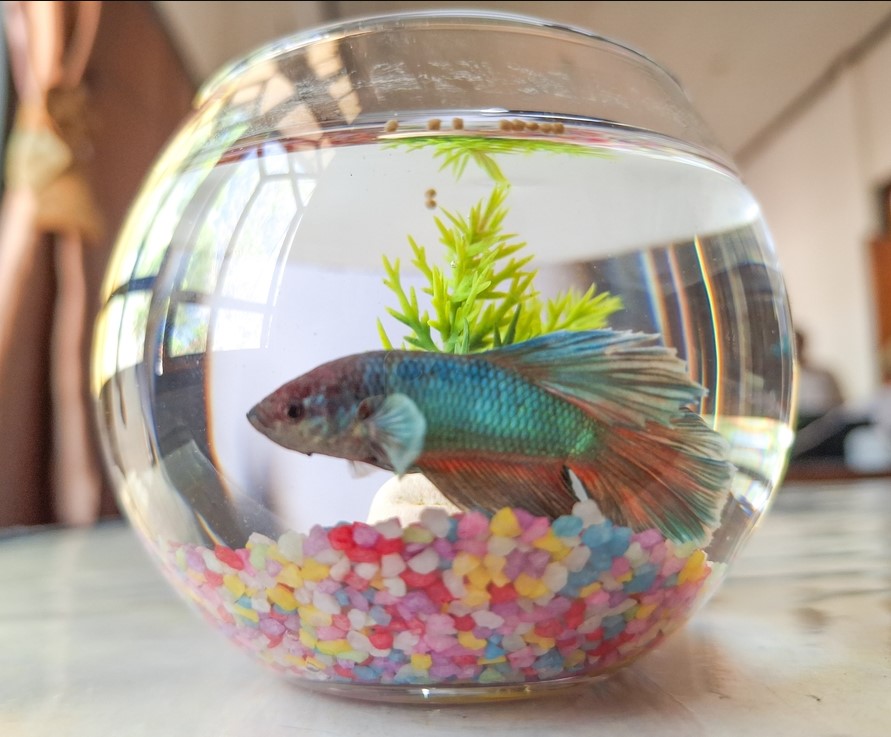
Can Betta Fish Live In A Fishbowl?
Yes, Betta fish can live in a fishbowl. Keeping Betta fish in a fishbowl is not recommended due to several reasons.
Fishbowls lack essential features for a healthy Betta fish habitat, including proper filtration, heating, and cooling systems. The curved shape and small size (typically 1-3 gallons) create poor water circulation, leading to stagnant water and low oxygen levels. This environment can cause stress, disease, and shortened lifespan.
Betta fish require a minimum 5-gallon tank with proper filtration, heating, and cooling systems to thrive. A well-maintained tank should have regular water changes (25-50% weekly), plenty of hiding places, and plants. Providing a suitable environment ensures optimal health, vibrant colors, and energetic behavior.
Avoiding fishbowls and opting for a suitable aquarium will extend your Betta fish’s lifespan (3-5 years) and improve overall well-being. Consider investing in a spacious tank, quality filtration system, and heating/cooling equipment. Your Betta fish will thank you! Remember, proper care and attention create a happy and healthy life for your finned friend.

